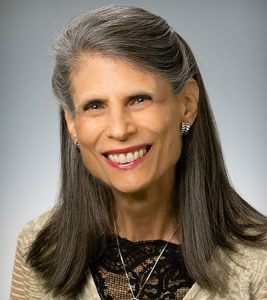 Cantor Laureate Sarah Sager Reflects on the Recent Women of Fairmount Temple’s Program with Our Sisters’ Keepers
Cantor Laureate Sarah Sager Reflects on the Recent Women of Fairmount Temple’s Program with Our Sisters’ Keepers
On Sunday afternoon, May 7, the Women of Fairmount Temple hosted a gathering of members of a unique organization in our city – Our Sisters’ Keepers. This is a women’s interfaith group started in 2017 by women from the Muslim Association of Cleveland East (MACE) in Richmond Heights and East Shore Universalist Church in Kirkland. It now embraces women of numerous Muslim, Unitarian, Jewish and Christian faith groups in Northeast Ohio as well as unaffiliated individuals.
Present at the event were women from several churches, mosques, and Fairmount Temple. They gathered to discuss the topic, “What’s in your garden? Whether it is the garden of your home or the garden of your spirit, what do you cultivate?”
I opened the program by explaining the centrality of the Torah in Jewish life and the obligation to study and to teach its narrative, principles, guidelines and laws. In addition, we talked of other concepts and values that Judaism enjoins us to cultivate such as: joy, gratitude, an awareness of being created b’tselem Elohim, in the image of God, tikkun olam — the responsibility to fix, correct, and perfect our world, to enhance our capacity to elevate all of life to a higher plane, and, to constantly make real in our lives, our actions, and our attitudes the commandment to “choose life.”
In addition to the stories that carry moral lessons and examples, it is filled with principles, guidelines, and actual laws that are meant to govern our behavior. Such instructions as: “The stranger, who resides with you shall be to you as the native among you; you shall not curse the deaf or put a stumbling block before the blind; you shall not falsify weights or measures; when you lay siege to a city…. do not destroy its trees; do not plow with an ox and an ass together; the wages of a laborer shall not remain with you until morning,” and many more, are found within its pages…. Judaism cultivates life itself as the highest value. In order to save a life, one can set aside virtually every other law. In any dilemma, if applicable, we apply the life test as we ask: “What is the most life-affirming decision?” Death is the great enemy in Jewish life. Nevertheless, we accept its inevitability while striving to resist it until that is no longer possible. Repeatedly, we are instructed in the Torah to follow God’s laws “so that we might live”, a living that is more than breathing in and out. It is a living in which we aspire to be the very best individuals we can possibly be by living according to what we believe God wants of us and to thereby elevate this life with our faithfulness and our actions….Every other law, instruction, guideline flows from this fundamental value – choose life, cultivate life. It is not always an easy choice or an obvious one. Sometimes it takes a great deal of deliberation and analysis to figure out what really is life-affirming and life-enhancing, but that is the goal. In a paraphrase of a famous description, Jews are a people who are intoxicated with life – its fullness and richness, its victories and defeats, its joys and sorrows, its endless variety and its confounding mystery, its unrelenting heartache and bountiful hopefulness, its beauty, its wonder, its sacred possibilities, and its eternal dream of peace.
These remarks elicited a great deal of interest, questions, and dialogue among the women, especially the excerpts cited above. Everyone present learned that there are no “minor” questions when one woman’s query, as to the rationale for not yoking an ox and an ass together, led us to appreciate what it means to respect and value all of God’s creation, and to treat with compassion all of God’s creatures.
By far, the most amount of discussion and debate revolved around the Jewish dictum to “choose life”. In the very lively and engaging discussion that principle elicited, the women explored the moral implications, according to Jewish law, of saving another’s life at the expense of one’s own, suicide, assisted suicide, end of life procedures, martyrdom, and the responses of the other faiths represented that afternoon to similar issues. The discussion was conducted at such a high level of interest, respect, and the desire to understand, that the program’s chairs had to step in and bring the conversation to a close so that the women could continue with the remaining parts of the program — including culinary treats from Purim, Pesach, Shabbat and Chanukah!!
There was an extraordinary atmosphere of warmth and friendship as well as understanding that we have our differences, and we share significant areas of belief and caring, and we can build lasting relationships of meaning and importance without denying our differences, but by embracing each other and our shared commonalities that are far more important.
This special gathering cultivates all of these values: the performance of mitzvot as we reach out to each other in friendship; as we yearn to learn about each other and to love each other as ourselves; we cultivated joy in our plans and preparations and now in the fulfillment of all of our efforts; further, we recognize that if we can build bridges of understanding and sacred purpose, we are cultivating the sacred work of tikkun olam, the repair and fixing of our world; in every possible way this is a life-enhancing occasion of hope and healing, of cultivation and aspiration for a world in which we are all Our Sisters’ Keepers.
Cantor Sarah Sager, Ssager@fairmounttemple.org
To learn more about our Women of Fairmount Temple, click here.
Copyright © 2025 Anshe Chesed Fairmount Temple. All rights reserved. Website designed by Addicott Web and hosted by Dynamics Online.